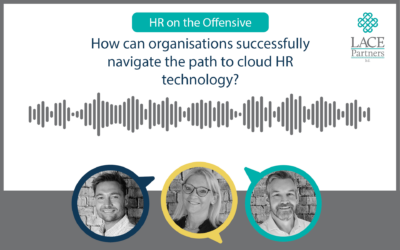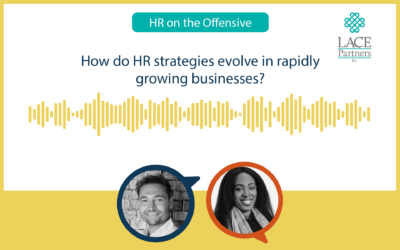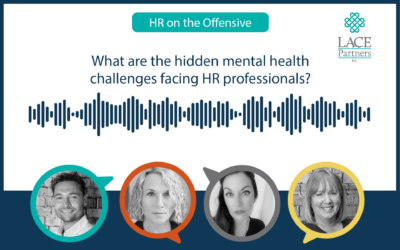Bosede from LACE spoke passionately on the HR on the Offensive podcast about tokenism, alongside our friends at The Clear Company. We covered a wide range of topics discussing the impact it can have and given how insightful the conversation was, we thought we’d share some of the key points in today’s blog.
Tokenism and imposter syndrome
How can a business ensure that it does enough to support people in knowing that they have earned their position in a business, and haven’t been chosen because they fit in to a certain ‘bucket’?
This was one of the first topics discussed in our recent podcast, and indeed, it is a challenge that many organisations must answer if they genuinely want their strategy towards diversity, equity and inclusion (DEI) to be successful. How can you assure your employees that they are not being used as tokens and are truly valued for their contributions to the organisation?
There are plenty of examples of how the pitfalls of tokenism can lead to potential negative consequences, including diminished employee engagement, higher turnover rates, and reduced productivity, but what could and should organisations be looking at? When we spoke to our friends at the Clear Company they gave us insight in to how, if an employee feels like an imposter or just a token, the organisation’s DEI strategy has already failed. Having a strategy that only addresses surface-level issues and isn’t comprehensive or transparent enough.
Organisations should, therefore, ensure the following are in place to support impacted individuals:
- Have an environment where people feel comfortable enough to speak up.
- Put in a mechanism where impacted employees are coached on overcoming imposter syndrome.
- Earn trust within the employee population such that employees feel that when they speak up, they will be heard, and their concerns addressed.
Implementing interventions is crucial to mitigate the negative impact of imposter syndrome, with research showing that imposter syndrome leads to procrastination (63%), longer working hours (57%), higher staff turnover (44%), and a productivity loss (41%).
Moreover, 39% of affected employees avoid applying for internal promotions. This syndrome, often triggered by feelings of not belonging, diminishes employee engagement, impacting productivity and organisational turnover. Targeted interventions can create a more supportive environment, alleviating imposter syndrome’s adverse effects on engagement and turnover.
Getting your DEI strategy right is not just about ticking a box because “it looks good.” In fact, there has been plenty of recent resistance for this very reason. It should be an integral part of an organisation’s thinking when trying to assess how to drive greater productivity amongst its people. As the Harvard Business Review states, true DEI goes beyond performative gestures and focuses on creating a genuine sense of belonging for everyone. This means empowering diverse voices, investing in inclusive practices, and celebrating unique perspectives. An effective DEI strategy isn’t a checkbox; it’s a key to unlocking your organisation’s full potential, leading to sharper decision-making, boosted innovation, and a workforce buzzing with enthusiasm and engagement.
Not only that, but as previous articles have also shown, more and more individuals are looking at a prospective employers approach to DEI as an impact on whether they would be taking a position. In short, a failure to adequately implement – and action – an effective DEI strategy will have a tangible impact on your ability to hire top talent.
The importance of clarity with your DEI strategy
As the panel pointed out on the podcast, communication, transparency and being clear on your approach to DEI and why you are taking that approach are fundamental in mitigating the risk of a perceived level of tokenism.
When an organisation implements initiatives and uses statistics to gauge their success, it’s crucial that they communicate why these numbers matter. Employees who feel clear about their company’s mission and purpose are 51% more likely to recommend their employer to a friend. Employees don’t want to feel like they’re simply being reduced to statistics; they want to understand how these initiatives drive growth and why diversity is beneficial for the organisation. For example, companies with diverse leadership teams have a 21% higher chance of outperforming their less diverse peers.
Tokenism can be inferred or perceived, with both non-impacted and impacted DEI employees feeling its sting. Underrepresented groups may feel tokenised, leading to isolation and resentment. Others may view quotas as mere exercises in checking boxes, fostering suspicion and mistrust. For everyone involved, the result is a negative impact on morale and performance.
Leadership must feel empowered in tackling tokenism
As with many successful corporate strategies, combating tokenism starts at the top. The importance of leadership behaviour in promoting inclusion and avoiding tokenism needs to be emphasised. Being able to empower managers to feel comfortable role-modelling inclusive behaviours and openly discussing these topics is crucial for success.
Fostering a culture where people feel able to not only speak up but also learn and course-correct any examples of tokenism has a significant impact on driving productivity. This echoes findings from Catalyst, which highlights the role of managers in building psychological safety and trust within teams, enabling employees to voice concerns and engage in open dialogue about inclusion.
It’s important for businesses and leaders to feel free to ask difficult questions, even if the answers may be uncomfortable. This is the first step towards identifying whether any employees feel like they are just “tokens” or suffer from imposter syndrome.
If you’d like to talk about your DEI strategies and approaches you can talk to our friends at the Clear Company here. We also ran a campaign last year on how you redefine workforce productivity, of which developing out an effective DEI strategy that eradicates tokenism plays a key part, which you can find out more about on the campaign page here.






